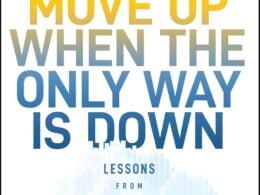This is an excerpt from “Leading From the Jumpseat: How To Create Extraordinary Opportunities By Handing Over Control” by Peter Docker.
Despite years of facing tough conversations, I still don’t find it easy, and it takes a lot of thought and planning. Having to talk with someone when they’ve made a mistake is difficult to do well, especially since different people respond in different ways.
A close friend of mine, Mike, is the bursar at one of the Oxford University colleges. He runs the team that makes the college function, from student accommodation to catering, security, and building maintenance, and everything in between. I’ve known Mike for many years, having served with him in the RAF. He’s an excellent Jumpseat Leader who is totally committed to lifting others up and helping them grow. Perhaps it’s little wonder he thrives in working for an organization designed around doing exactly that.
Among his many skills, Mike is someone I respect for his ability to have tough conversations in service of lifting others up. He seems to me to be a master in this, with a natural ability to find the right words and appropriate tone. It’s such an important skill for any leader, and I wanted to learn Mike’s secret so I could improve. We met for lunch, and I asked him about how he was able to tackle these conversations with such ease. Showing natural humble confidence, Mike seemed genuinely surprised when I said I saw him as an expert in this. He explained that, ahead of a tough conversation, he would often lie awake at night, rehearsing all the possible ways he could approach the situation and the likely outcomes. To Mike, having tough conversations is, well, tough. What’s key to his ability to do this so effectively is his belief in the potential of others. His motivation to take on any tough conversations is because he wants the other person to be the best version of themselves.
What’s key to his ability to do this so effectively is his belief in the potential of others. His motivation to take on any tough conversations is because he wants the other person to be the best version of themselves.
Mike’s explanation gets to the nub of how we can best deal with mistakes as a Jumpseat Leader. It calls on us to care enough to invest our time. It’s relatively easy to rip into someone when they have made an error. But this reaction usually comes from our own fear. We fear how someone’s mistakes may affect our life, livelihood, status, or reputation. When fear is driving us, it can cause us to spiral downward. Our negative reaction will no doubt also cause the person to feel cast out and deflated, and to have their sense of belonging undermined. This in turn can diminish their engagement and the contribution they are willing to make going forward. A downward spiral can have ramifications way into the future.
In the critical seconds before we start a tough conversation, we can choose for what follows to become an opportunity for positive growth. Does this mean that we always go easy on people when they make a mistake? Not at all. We must be guided by how much they care about what they have done and the impact it has had. And if they don’t care enough, perhaps that says more about our leadership and the environment we create than it does about them.
Consider this
When anyone on a team makes a mistake, it’s an opportunity to create a spiral up and avoid a spiral down. We need to be ready to pause and resist any natural tendency to react, often driven by the fear of our life, livelihood, status, or reputation being threatened.
When anyone on a team makes a mistake, it’s an opportunity to create a spiral up and avoid a spiral down.
Learning to fly
Consider this: How we treat ourselves is usually how we treat others.
- How do you view your own mistakes?
- Do you immediately try to fix them?
- Do you hide them?
- Do you pause before criticizing yourself?
- Take note of your actions and feelings.
Mistakes are unavoidable. We are human. Show yourself some grace, take a deep breath, and then take action. The next time someone lets you down, take a moment to consider how you want your conversation with them to end. Do you want them to remember what you said so they have the opportunity to learn and make it right? Or do you want them to remember the way you said it, which will likely make only you feel better?
Flying
Consider this: As you take on more responsibilities and work with more people, there is more room for error.
Find free courses, mentorship, networking and grants created just for small businesses.
The next time you need to have a tough conversation, take some time to consider what you are going to say and how the other person may respond. Play out different scenarios in your head, taking into account the long-term outcome you’re seeking, not just the immediate result.
Be guided by what you stand for. This will allow you to be better prepared for the conversation and to act from a place of continuing to nurture a sense of belonging.
Teaching others to fly
Consider this: The next time a public mistake is made, use it as an opportunity to lift that person up in front of everyone.
Show your team that mistakes can happen, and when the choice is made to correct it together, everyone prospers and continues to feel they belong.
Leading from the jumpseat
Consider this: The next time you sense someone is on a downward spiral, help them to see it can be an opportunity for positive growth.
Sit down and listen to them. Relate to them and, if possible, highlight a time in your life that mirrors what’s going on in theirs.
Explain the steps needed and the time it took, so they can begin to see the possibility of their own upward path.
This excerpt from “Leading From the Jumpseat: How To Create Extraordinary Opportunities By Handing Over Control” by Peter Docker, copyright 2021 by Why Not Press, is reprinted with permission.








